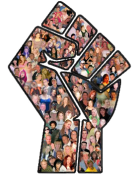We have got the power

If I say «Web 2.0», probably most of you will think to social networks as Facebook, Myspace, or LinkedIn, social bookmarking services as Digg or Del.icio.us, wiki as Wikipedia and blogging platforms as Blogger or Splinder, digital asset sharing services as YouTube or Flickr, and so forth. Hundred different sites and services for several different purposes. We call all of them «web 2.0 sites», but what do they have in common? Mostly nothing, apart that most of their content is generated by users. Apart that, people subscribe to those services for many different reasons. For example, I can use Myspace to promote my artistic work, LinkedIn to generate some business deal, Digg to save somewhere my favorite locations, Flickr to share with friend the pictures of my last vacation. Every site has a different orientation, but users may also decide to deviate and use them differently. Of course I cannot use Wikipedia to promote myself nor Flickr to create a porn site, but apart some limitations, it is up to the users to decide how and why we want to use those services.
Is that enough? We just classify them as web 2.0 and that is all? In my opinion this is the first step. The web is still at the beginning. Not really a baby, but surely it is a teen, not an adult. We have not yet a mature web, but we are growing. So, it is time, in my opinion, to discriminate few different levels within the web 2.0 scenario.
We said that a site or a service can be called web 2.0 if it is featuring user-generated content. Let us say this is level one, the lower. If I submit a video on YouTube, I am acting at level one. Same for submitting a bookmark to Del.icio.us or an image on Flickr. Of course it could be commented and it could generate some discussion, but nothing more. I can also send notifications to friends, invite other users to see my content. Just like a blog: I write an article and allow others to discuss it. It is a very self-centered usage of web 2.0. It is social because several people are involved, but there is a focus: me. In some way, also Facebook or LinkedIn are at level one. Much more content sharing, a lot of relationships, but really an agglomerate of individual-centered contents, even when we share someone else’s content.
Now, let us consider Wikipedia. That is different. I generate some content and someone else may change it; at last we have some article about a specific subject. I do not care now if it is reliable or not. That is another cake. Co-generation of content is the second level. It is a different flavor because the final result is due to the contribution of several people, even if each piece can be still associated to some specific editor. That article is the delivery of a teamwork, even if there is not really a team, strictly speaking. Collaborative working, anyway. Why? Each one might have different reasons, different purposes. So, there is not necessarily a common objective, even if apparently the common goal is to produce a specific article. What is motivating people to do it, anyway, could be very different. It is surely a social event, not so self-centered as in level one, but not yet so social-centered.
Level three is when people works together to produce something for a common objective, possibly a social objective. This is a more mature level, because cooperation means also coordination, natural leadership, sacrifice, placing the common objective above personal reasons: doing something together for a better web, maybe for a better world. I do not know many of such sites and services. In some way GalaxyZoo could be considered close to level three but there is not a real coordination among people, even if there is a forum to share experiences and support each others. Furthermore the basic content is provided only by a team of scientists, whereas all the other participants cooperate only to classify galaxies. So, not yet a level three, and probably not a pure web 2.0 site.
So, are there level three web 2.0 sites around in the world? I do not know. Surely not Facebook or LinkedIn, Myspace or YouTube. Nice and useful services, but still too egoistic, too much oriented to the single individual. The term social is not simply a matter of relationships; it is much more. Of course, in Facebook we have «causes», but let us be honest: how many causes generated really a social value? Very few, and not because of Facebook but because of people. A similar result could be also obtained by using social-work-oriented traditional sites.
My hope? To have in future more and more «level three» web 2.0 sites, because we can make the difference, we can change our society, we can generate and deploy real value by using the web, but we have to think differently when we speak of web 2.0. We have to think to the others, we have to think to future generations, we have to exploit the real power of the web for much more than sharing pictures or our own work. We have to sustain a new web, a sustainable web, an ethical one, a web made by people for people, because we have got the power now, but we still have to learn how to use it.




















Please use Facebook only for brief comments.
For longer comments you should use the text area at the bottom of the page.
Facebook Comments